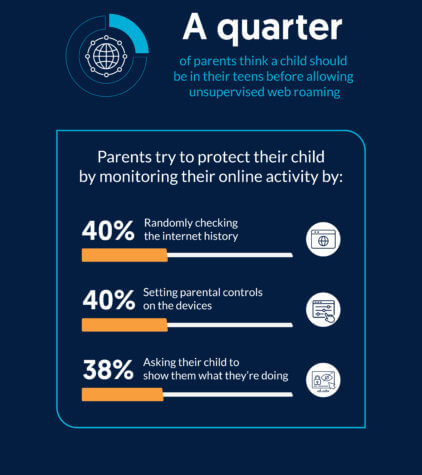
NEW YORK — Is all that time spent on social media, gaming apps, and streaming services turning kids’ brains into mush? Seven in 10 American parents are worried their children are turning into internet “zombies,” according to a survey.
The study polled 2,000 American parents of school-aged children and found 64 percent are concerned about the amount of time their children spend on the internet. Another two in three believe their child’s overall behavior has changed as a result of increased time online.
While 71 percent trust their child is mature enough to roam the web unsupervised, a quarter of parents think a child should be in their teens before allowing this. Still, the average parent surveyed let their child browse the internet independently at 11 years-old.
Generally, parents think it’s inevitable that their child will see something inappropriate on the internet when they’re not able to monitor them (68%) or while they’re at school or doing homework online (71%).
Parents are also worried that their child might receive messages from strangers (43%) or may accidentally access inappropriate content (39%).
Conducted by OnePoll on behalf of Lightspeed Systems, an online safety and analytics solutions platform, the survey found that it isn’t uncommon for parents to monitor their child’s online activity by asking their child to show them what they’re doing or set parental controls on the devices (40%).
Keeping your kids safe online
Similarly, 38 percent conduct random checks on their children’s internet history, and 37 percent make their kids hand over their devices at bedtime. Nearly half the poll have caught their child on the internet or social media when they were supposed to be doing homework (49%) and even more believe their child tells them they’re doing homework or research for school as an excuse to go on the internet (63%).
Of those whose children have a school-issued device, more parents feel like they have less awareness about the websites their child visits on those devices than personal ones (66% vs. 75%).
Consequently, nearly all of these parents would opt for their child’s school to use monitoring software on these devices to detect interactions with concerning or inappropriate content online (90%).
“It’s important for parents to discuss internet safety with their kids to ensure they’re being as safe as possible when online. Although 64 percent of parents have tried, many reported that it’s hard to get the message across,” says Brian Thomas, CEO of Lightspeed Systems, in a statement. “Schools rely on our AI-based software and human review team to ensure that they see warning signs of mental health issues and can intervene before an incident occurs. Last school year, we issued over 300,000 alerts for self-harm and violence.”

Schools to the rescue
The same percentage are already confident in their school’s ability to monitor online activity, with a whopping 92 percent of parents admitting they rely on the school’s vigilance to protect their children.
Three in four parents whose child has a school-issued device say they’ve already experienced a situation where the school has flagged them of inappropriate or dangerous behavior when monitoring the device.
“This may be why the majority of parents (72%) said that they would want their child’s school to contact them about concerning online behavior,” Thomas continues. “Recently, one of our clients shared with us that 87 percent of our alerts to her district were for students who were not known to be experiencing mental health issues, and who otherwise would not have received the help they needed.”

The same parents hand their children electronic devices like they are pacifiers so they themselves can stare at a electronic device without interruption. “Here, take this and don’t bother me” is the feeling I get when I see parents with their children in a restaurant. Everyone looking down at their phones and tablets. Parents shocked that children mimic their parent’s behavior.
Children are a product of their environment.
100%
When you see a group of kids walking down the street, almost none are conversing with each other but instead they got their total attention and little beaks in the smartphone.
My granddaughter is like this and the 20 month old is becoming so! The Chinese already know the internet, gaming, electronics are habit forming just like drugs.
I’ve been hearing more about these “wait for 16” groups where parents are getting together with their students kindergarten or first grade classes and making pacts for no cell phones until they’re kids are 16. That way there isn’t the peer pressure to get your kids hooked on the device early. The more of this the better for the future
Why the blame on China? Everyone knows it.
If Parents are just noticing this. Pretty obvious who the Zombies are. Too bad their parents didn’t notice it.
This is simply so easy to agree as you have stated.
One thought is that this article tries to state in support of the embedded sub “by-line” that schools are there at the rescue is so blatantly false.
My kid has this fun Friday event and was pining to take a smart device to school to feel included and not judged. The school promotes this event that is supposed to be a rewards based enabler for them. The problem I point out is that the kids are comparing and rating themselves as to the devices they have (my Boy is 9). All the while, when this disparity of being without is cascaded onto those children that “have not”, this judgemental attitude that is indirectly being fostered by this fun Friday event is totally missed when pointed out to the educator expressly, with the principal and superintendent all at the same time in this conversation.
It seems that as always, these educators always come in at the end to try to take credit in saving the day just like doctors who prescriibe you a pill or shot in the arm that mask the issue.
Yes, first and foremost, it is active and engaged parenting that is lacking.
Having children is easy. Parenting involves actual work.
7 of 10 kids think their parents are internet zombies
Great article and very necessary…I have coined a few terms concerning people and their use of the internet, devices, and social media…Devices Zombies, Device Induced Autism and my favorite, Tik Tok Induced Retardation Syndrome (which sadly, is oftentimes fatal).
A study was needed to find this out? How much money was wasted?